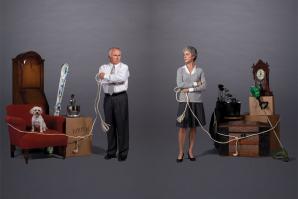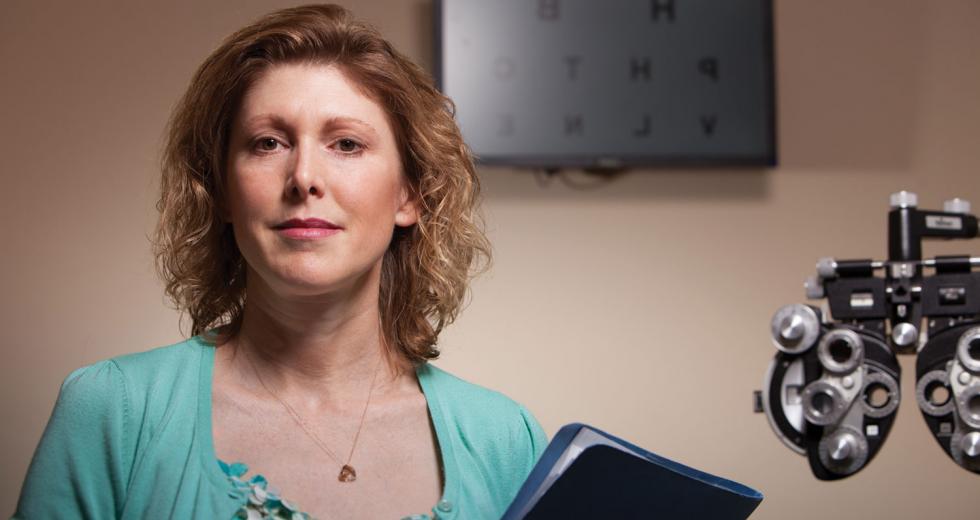When Dr. Dena Davidson graduated from the UC Berkeley School of Optometry in 1995, she thought her income expectations were pretty reasonable.
“I knew being an optometrist was not going to make me rich,” she says, “but I felt I would be fairly comfortable.”
“Comfortable” meant a good salary that would afford her a decent lifestyle and savings for retirement. As a highly trained health care professional, Davidson anticipated future employers would provide the means for her to do this through a company-sponsored 401(k) or Individual Retirement Account. But it has not worked out that way. For more than half of the past 17 years, much of it spent working for small practices or as an independent contractor, Davidson has been among the millions of Americans without access to an employer-sponsored savings plan.
While Davidson, 43, set up her own Roth IRA and Simplified Employee Pension during the periods when she did not have access to an employer-sponsored plan, experts say she is far more the exception than the rule.
Americans are notoriously poor savers (about 4 percent annually) compared to the rest of the industrial world (about 10 percent). But now, with legions of baby boomers soon to be entering retirement with barely more than Social Security to live on, lawmakers nationwide are looking to prod many of these workers to help themselves. To do that, lawmakers are counting on significant help from private-sector employers.
In California, that effort is in the form of Senate Bill 1234, authored by Sen. Kevin de León, a Democrat whose Los Angeles-area district is one of the poorest in the state. The measure, co-authored by Senate President Darrell Steinberg, (D-Sacramento), would create a private-sector pension plan for workers without access to one through their employer.
Under the plan, workers could put 3 percent of gross income into an investment pool managed by a professional retirement management company. That entity would answer to a panel working under the state treasurer’s office and be allowed to invest only in conservative vehicles tied to U.S. Treasury bond rates. Private sector pensioners would receive a small, yet-to-be-determined, regular payment from the state to serve as a supplement to Social Security income, which currently averages less than $1,200 a month.
On the private side, employers would be allowed but not required to match employee contributions. Employers would need to let their employees use the company’s payroll system to make their pension deposits. If this rule were violated, the employer would face steep fines. But the plan includes no other administrative fees and employers would not bear any of the usual fiduciary responsibilities that come with a retirement plan.
Workers would be automatically enrolled in the new system if their company had five or more employees and did not offer an existing employer sponsored plan – but they could also opt out. Workers at companies with an existing retirement plan could also participate, but employers would not be required to let them use the company payroll system to make contributions.
In a statement, de León said California is facing a $600 billion personal retirement income deficit, making the bill vital to prevent the state from becoming “home to a sea of discarded seniors.”
It is no idle concern. According to a 2011 AARP study, 25 percent of all U.S. workers 50 or over have exhausted their entire life savings getting through the recession. Another study from the National Bureau of Economic Research shows that half of Americans would struggle greatly to come up with even $2,000 for a financial emergency. A March survey from the Employment Benefits Research Institute shows 30 percent of workers have saved less than $1,000. Given Social Security’s well-documented funding struggles, even counting on that is an iffy proposition.
Losing all or part of that income would be devastating to a huge number of retirees.
That’s because far too many people approach retirement planning the way they would a root canal — avoid it until there is no other choice. Having access to a retirement plan through an employer certainly helps, and most workers have come to rely exclusively on those offerings to save money for their golden years. But while many employers provide such plans, just as many don’t. According to the Brookings Institute, about half of all working Americans — about 78 million — don’t have access to an employer-sponsored plan. Further research from the University of California shows that approximately 7 million of those workers are Californians.
Although anyone could follow Davidson’s example and save for retirement on their own, for a variety of reasons — low income, lack of knowledge — far too many people don’t. The U.S. Commerce Department reported in February that after spiking at about 8 percent in 2008, Americans’ monthly savings rate has dropped to less than 4 percent. We also still are quite fond of buying things on credit. Commerce reported in April that, while Americans’ consumer debt has fallen by about $600 million since 2008, our collective debt total is still $13.2 trillion. CreditCard.com, an online consumer credit card marketplace and news site, reports the average U.S. card holder is carrying almost $16,000 in balances.
Ghastly as that sounds, it may only be the beginning. Many experts say the long-term impact of millions of boomers retiring while precariously clinging to the rickety life raft of Social Security will create a tsunami of near-poverty retirees dependent upon taxpayer-funded programs such as Medicaid. In that way, it is a hurt we will share.
To that end, de León’s proposal has drawn support from groups like AARP California. But it also is not without detractors. With public pension reform a hot topic around the Capitol this year, Roger Niello, president and CEO of the Sacramento Metro Chamber, questions the bill’s timing.
“What do you do politically when there’s lots of pressure for some kind of public pension reform and you know you can’t do it? The answer is you change the subject, which is what this bill does,” he says.
The bill’s defenders vehemently deny the accusation.
“Not true,” says Steinberg. “We’re going to get pension reform done this year regardless. This proposal is totally separate. Our only goal is to bring everybody up to some level of retirement security.”
Gregory Hayes, Sen. de León’s communications director, is even
more emphatic.
“This bill has absolutely nothing to do with public sector
pension reform. Nothing at all,” he says. “Sen. de León has been
working on this for years.
“All we’re trying to do is create something that allows millions of Californians to supplement their Social Security so they can have a modest retirement instead of living a life of poverty,” he adds.
But a wealth of other concerns abound. Jeff Chang, a partner in Chang Ruthenberg and Long, a Folsom legal firm specializing in employee benefits law, questions whether the focus is on the right area.
“I have to ask if this is the right priority for California lawmakers,” he says. “Small businesses already have a lot of retirement vehicles available to them. Why create more rules? I think we need to worry more about getting people back to work in the first place.”
Mike Genest, California’s former budget director under Gov. Arnold Schwarzenegger, also takes issue with the proposal. Genest says that while he agrees with the bill’s intent and believes it would work under all the strict conditions proposed, he doubts lawmakers would be able to adhere to them over the long term.
“Imagine 15 years from now if every private sector worker has this pension, and it is just a fraction of what the state provides to its own employees,” he says. “How long is that going to be politically sustainable? How long will the Legislature be able to say to the private sector, ‘That’s all you get’?”
If lawmakers succumb to pressure to increase pension benefits, he says, any shortfalls could end up coming from the state’s general fund.
But Hayes rebuts that assertion, saying the bill requires a full feasibility study before the pension plan could be enacted. Even that study must be paid for by money from somewhere other than the general fund.
“The bigger fear here should be that we’re going to have millions of people retiring into poverty,” he says. “When these people retire, it’s going to put a terrible stress on our social safety networks.”
Hayes also scoffs at the assumption that the lowest-wage earners would not be willing to part with even a small portion of their pay for investment.
“We’re only talking about 1.7 cents of each dollar,” he says. “Not to be insensitive, but it’s hard to have much sympathy for losing that small of an amount of money each month.”
So far, most business advocacy groups have taken a wait-and-see outlook on the measure. The California Chamber of Commerce, most notably, has not included the proposal on its list of “job killer” bills in the Legislature. Others, such as Small Business Majority and the California chapter of the National Federation of Independent Business, have not taken a position on the bill.
It has drawn support, however, from at least one somewhat
surprising source.
Marcia Fritz, owner of Fritz Russell CPAs in Citrus Heights, says
she supports the proposal. That is significant in that Fritz has
become one of the state’s most ardent and well-known advocates
for public employee pension reform. Even so, she says anything
that helps small businesses attract and keep good workers is
worth investigating.
“I’m certainly open to this,” she says. “I would love to be able to offer it to my employees.”
Dr. Robert Miller also supports the proposal, though not without trepidation. Miller, owner of Advanced Valley Eye Associates in Davis, has 10 employees, including Dean Davidson.
A self-described libertarian, Miller says he has nonetheless embraced “the current system of employers encouraging employees to save for themselves” by offering a 401(k) plan with matching funds up to 4 percent. He also pushes his employees to put money into the plan every month, no matter where they are on the pay scale, saying, “It is the right thing to do for everyone, no matter what they are making, to save money so they can take care of themselves in retirement.”
In that regard, he is OK with workers being automatically enrolled into a savings plan, even if he also worries that the government is too intrusive in people’s lives.
“It is unfortunate because this is the type of society we have become,” he says. “I’m not sure you can realistically legislate positive behavior.”
Citrus Heights resident Matt Spencer agrees with that assessment, but says he is not so inclined to go along. Spencer, 26, graduated in 2009 with a degree in criminal justice from Sacramento State and, like Davidson, had high hopes for what his career would bring, including an end to years of working low-wage jobs with no benefits.
But with the recession brutalizing local governments, finding an opportunity in law enforcement has proven fruitless. Before recently starting a new job with an insurance company that provides access to benefits and a retirement plan, he paid the bills by bussing tables in restaurants and managing a self-storage facility, never earning more than $30,000 in a year. Even so, while he lauds the pension proposal in concept, Spencer says he’s not interested.
“The state has a way of taking good ideas and screwing them up,” he says, adding, “It’s not the government’s job to take care of me.”
It isn’t the usual idle chatter of youth. Like Davidson, Spencer has not rationalized his employment situation as a reason to not save any money, instead opening his own Roth IRA at age 19. He says his contributions have fluctuated with his income, but he is now investing approximately 10 percent of his earnings.
This, however, is where they diverge. In spite of Hayes’ admonitions, Davidson does wonder how many low-wage workers living hand to mouth each month would put even a few dollars into such an account each paycheck. She also notes that many people don’t come from an upbringing like hers, which included parents that emphasized saving money and staying out of debt. Even so, she thinks SB 1234 is something worth pursuing if only as a matter of fairness.
“I felt cheated,” she says in reflecting on her time without access to an employer-sponsored retirement plan. “I like the proposal because it is mandating opportunity. Whether people take advantage of it or not is on them, but it isn’t fair that they don’t have the opportunity.”
Recommended For You

Golden Years Go Broke
When divorce sucks the life out of retirement
Visions of the golden years often include thoughts of second homes, lush fairways and RV cruises through Yellowstone, but for more and more aging baby boomers, one traumatic event — divorce — can upend plans for retirement.

Investment Property
The return of 100-percent financing
Remember the wild days of the real estate boom when you could buy a house with nothing down? You still can. Well, maybe you can’t, but a very select group of wealthy buyers can.



